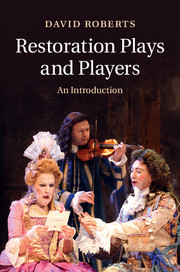7 - Audiences and critics
Published online by Cambridge University Press: 05 November 2014
Summary
The Way of the World ends with a conflict of pen and sword. Mirabell flourishes the will that dashes forever Fainall’s hopes of a financial settlement, and Fainall’s reaction is to offer to run through his estranged wife. It is tempting to call it a triumph of the pen, of law and civility, over violence; except that Mrs Fainall is really saved not by a waft of parchment but by the bulk of Sir Wilful Witwoud, a country cousin who has learned some of the rules of drawing room behaviour and can sound, for all his physical presence, as haughtily disapproving as any dowager: ‘Hold, Sir,’ he interjects, ‘now you may make your Bear-Garden flourish somewhere else, Sir.’
If Fainall’s defeat is that of Stuart droit de seigneur, Sir Wilful’s lecture in manners charts how far the theatre had come since the days when playhouses abutted less civilized forms of entertainment. Yet Restoration playgoers occasionally lived as much as Mrs Fainall in fear of the sword, and without Sir Witwouds to accompany them. In 1712 The Spectator dramatized the tension between violence and civility. Here, a respectable citizen – an invention worthy of Mr Pooter in the Grossmiths’ Diary of a Nobody – recalls an encounter with an arrogant toff:
I do not wear a sword, but I often divert myself at the theatre… I was in the pit the other night, (when it was very much crowded) a gentleman leaning upon me, and very heavily, I very civilly requested him to remove his hand; for which he pulled me by the nose. I would not resent it in so public a place, because I was unwilling to create a disturbance; but have since reflected upon it as a thing that is unmanly and disingenuous, renders the nose-puller odious, and makes the person pulled by the nose look little and contemptible.
- Type
- Chapter
- Information
- Restoration Plays and PlayersAn Introduction, pp. 164 - 188Publisher: Cambridge University PressPrint publication year: 2014



